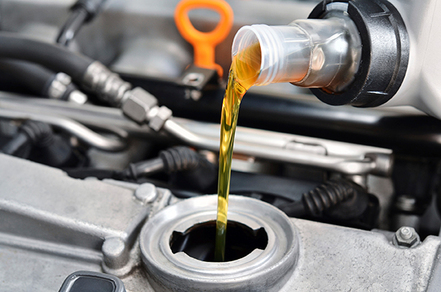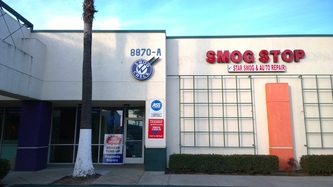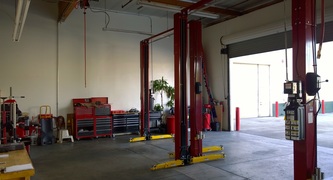OIL CHANGE
Your car is a major investment.
That’s why we recommend you protect it with timely maintenance.
Why do I have to change my oil?
Oil lubricates the moving parts of your engine. It keeps them cool by lowering friction and carrying heat away. It also keeps any grit or tiny particles from scratching tightly-fitted parts.
Heat breaks down oil. It can make the oil gummy or watery (or both), so that it doesn't lubricate properly. And the longer it's in the engine, the dirtier it gets.
Replacing old oil with new fixes all these problems. The fresh oil lubricates and cools better. When you flush the old oil out, you also flush away any grit or dirt in it.
Getting your oil changed regularly is probably the single best thing you can do for your engine. To reduce repairs and improve performance, follow your manufacturer's oil change recommendations listed in your owner's manual.
There are two reasons why lubricants need to be changed periodically:
The most important reason is chemical change of the lubricant itself. The lubricant looses its lubricating capacity due to chemical decomposition of the oil itself and due to depletion of the chemical additives that are present in modern oils.This loss of multi-viscosity property is sometimes referred to as "Viscosity Break-Down" The more severe are the operating conditions, the faster does this change occur.
The second reason is removal of wear particles that are present in the lubricant and which can not be removed by normal filtration. The greater the loads to which the mechanism is subjected the faster is the wear and more wear particles are present in the oil. Frequent starting and stopping of the engine, especially in winter, also increases wear and formation of "cold sludge".
How often should I change my oil?
Substances like dust, metallic shavings and even antifreeze contaminate engine oil. As these contaminants are whipped into the oil, they form sludge. The sludge adheres to parts of the engine, causing it to perform less efficiently. If the oil is not changed, the sludge can eventually cause engine failure.
Oil change intervals depend on vehicle make, model and year, as well as on driving conditions.Always refer to your owner’s manual for the manufacturer’s recommendation for your specific vehicle. Most manufacturers recommend oil changes every 3,000 to 7,500 miles, the lower range for “severe” conditions, the upper range for “normal” conditions.
Severe driving conditions include:
Extensive idling or stop-and-go traffic
Extremely cold weather (less than 10 degrees),
or extreme heat (more than 90 degrees)
Extreme humidity
Towing a trailer or hauling heavy materials
Mountainous, dusty or de-iced road conditions
Schedule your Lube and Oil Change Soon.
What Kind of Motor Oil should I use for my Vehicle
Motor oil can be segmented into four basic varieties—synthetic oil, synthetic blends, high mileage oil and conventional oil.
Conventional motor oil
is what its name implies—it uses base oils enhanced in the blending process with chemical additives to help meet the manufacturer's desired levels of heat tolerance, breakdown resistance and viscosity (viscosity simply being a technical term for the thickness and fluidity of the oil). Conventional motor oil can be had in a range of viscosity grades and quality levels, from adequate to an extensively designed, high-quality lubricant. Conventional motor oil is recommended for drivers with low-mileage, late-model cars whose driving habits can be described as routine—commuting, running errands, vacation driving at relaxed cruising speeds. Today more and more engines require synthetic oil, so be sure to check your owner’s manual to make sure you don’t invite avoidable engine problems or void your warranty.
Synthetic blend motor oil
use's a mixture of synthetic and conventional base oils for added resistance to oxidation (compared to conventional oil) and to provide excellent low-temperature properties and are recommended for cars, trucks, vans and SUVs that regularly carry heavy loads, tow trailers and/or operate frequently at high RPMs.
Synthetic motor oil
is a laboratory synthesis of precisely controlled ingredients created by oil engineers, scientists and chemists. When combined with a high-performance additive package, this results in an oil with the highest levels of lubrication and engine protection, generally offering better protection at startup, better cleansing qualities, enhanced durability and better protection against heat buildup.
High-mileage motor oil
is specially blended for older vehicles, or vehicles with higher mileage. Typically, 75,000 miles (120,000 kilometers) is the figure used regarding high mileage oil. Some high mileage, high-performance cars, however, will be better served by continuing to use a synthetic motor oil. That said, a special high mileage motor oil blend, with its unique additives and viscosity, helps reduce oil burn-off, helps in sealing oil leaks and helps improve combustion chamber sealing to help restore engine compression. It all adds up to enhanced performance in older engines.
Your car is a major investment.
That’s why we recommend you protect it with timely maintenance.
Why do I have to change my oil?
Oil lubricates the moving parts of your engine. It keeps them cool by lowering friction and carrying heat away. It also keeps any grit or tiny particles from scratching tightly-fitted parts.
Heat breaks down oil. It can make the oil gummy or watery (or both), so that it doesn't lubricate properly. And the longer it's in the engine, the dirtier it gets.
Replacing old oil with new fixes all these problems. The fresh oil lubricates and cools better. When you flush the old oil out, you also flush away any grit or dirt in it.
Getting your oil changed regularly is probably the single best thing you can do for your engine. To reduce repairs and improve performance, follow your manufacturer's oil change recommendations listed in your owner's manual.
There are two reasons why lubricants need to be changed periodically:
The most important reason is chemical change of the lubricant itself. The lubricant looses its lubricating capacity due to chemical decomposition of the oil itself and due to depletion of the chemical additives that are present in modern oils.This loss of multi-viscosity property is sometimes referred to as "Viscosity Break-Down" The more severe are the operating conditions, the faster does this change occur.
The second reason is removal of wear particles that are present in the lubricant and which can not be removed by normal filtration. The greater the loads to which the mechanism is subjected the faster is the wear and more wear particles are present in the oil. Frequent starting and stopping of the engine, especially in winter, also increases wear and formation of "cold sludge".
How often should I change my oil?
Substances like dust, metallic shavings and even antifreeze contaminate engine oil. As these contaminants are whipped into the oil, they form sludge. The sludge adheres to parts of the engine, causing it to perform less efficiently. If the oil is not changed, the sludge can eventually cause engine failure.
Oil change intervals depend on vehicle make, model and year, as well as on driving conditions.Always refer to your owner’s manual for the manufacturer’s recommendation for your specific vehicle. Most manufacturers recommend oil changes every 3,000 to 7,500 miles, the lower range for “severe” conditions, the upper range for “normal” conditions.
Severe driving conditions include:
Extensive idling or stop-and-go traffic
Extremely cold weather (less than 10 degrees),
or extreme heat (more than 90 degrees)
Extreme humidity
Towing a trailer or hauling heavy materials
Mountainous, dusty or de-iced road conditions
Schedule your Lube and Oil Change Soon.
What Kind of Motor Oil should I use for my Vehicle
Motor oil can be segmented into four basic varieties—synthetic oil, synthetic blends, high mileage oil and conventional oil.
Conventional motor oil
is what its name implies—it uses base oils enhanced in the blending process with chemical additives to help meet the manufacturer's desired levels of heat tolerance, breakdown resistance and viscosity (viscosity simply being a technical term for the thickness and fluidity of the oil). Conventional motor oil can be had in a range of viscosity grades and quality levels, from adequate to an extensively designed, high-quality lubricant. Conventional motor oil is recommended for drivers with low-mileage, late-model cars whose driving habits can be described as routine—commuting, running errands, vacation driving at relaxed cruising speeds. Today more and more engines require synthetic oil, so be sure to check your owner’s manual to make sure you don’t invite avoidable engine problems or void your warranty.
Synthetic blend motor oil
use's a mixture of synthetic and conventional base oils for added resistance to oxidation (compared to conventional oil) and to provide excellent low-temperature properties and are recommended for cars, trucks, vans and SUVs that regularly carry heavy loads, tow trailers and/or operate frequently at high RPMs.
Synthetic motor oil
is a laboratory synthesis of precisely controlled ingredients created by oil engineers, scientists and chemists. When combined with a high-performance additive package, this results in an oil with the highest levels of lubrication and engine protection, generally offering better protection at startup, better cleansing qualities, enhanced durability and better protection against heat buildup.
High-mileage motor oil
is specially blended for older vehicles, or vehicles with higher mileage. Typically, 75,000 miles (120,000 kilometers) is the figure used regarding high mileage oil. Some high mileage, high-performance cars, however, will be better served by continuing to use a synthetic motor oil. That said, a special high mileage motor oil blend, with its unique additives and viscosity, helps reduce oil burn-off, helps in sealing oil leaks and helps improve combustion chamber sealing to help restore engine compression. It all adds up to enhanced performance in older engines.

Call us today to schedule an appointment for your vehicles oil change.
We can help you at our Archibald Store Location
8870 - A, Archibald Ave,
Rancho Cucamonga CA 91730
909 484 7664 Mon-Fri 8:30 AM - 5:00 PM
909 581 1980 Saturday 8:30 AM - 3:00 PM







